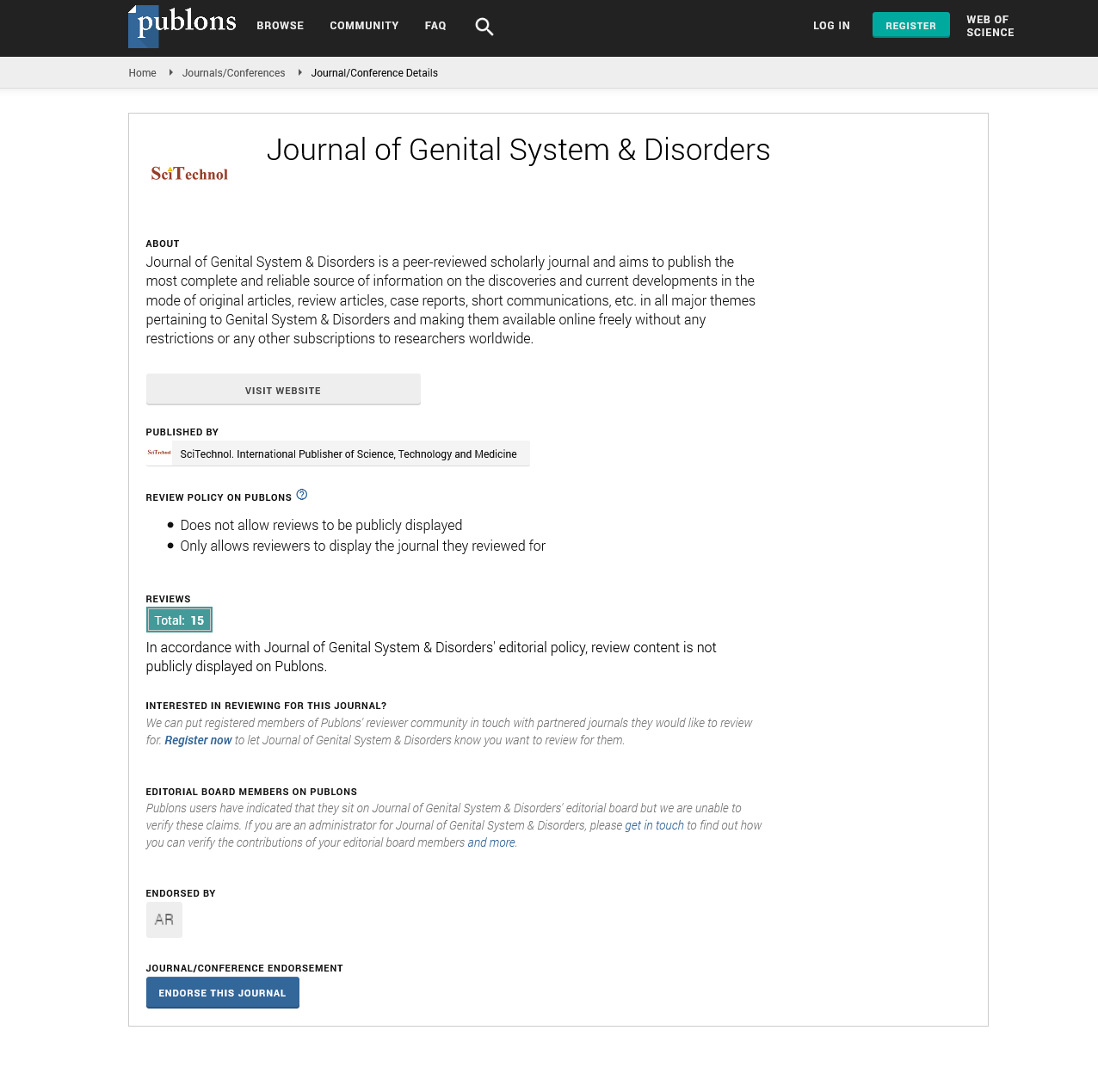Perspective, Vol: 14 Issue: 1
Potential of CRISPR Technology in Revolutionizing Reproductive Medicine
Jessica Lee*
Department of Reproductive Biology, Institute of Reproductive Biology, University of Chicago, Illinois, United States
*Corresponding Author: Jessica Lee
Department of Reproductive Biology, Institute of Reproductive Biology, University of Chicago, Illinois, United States;
E-mail: jessicalee@gmail.com
Received date: 02 March, 2024, Manuscript No. JGSD-24-128706;
Editor assigned date: 04 March, 2024, QC No. JGSD-24-128706 (PQ);
Reviewed date: 18 March, 2024, QC No. JGSD-24-128706;
Revised date: 03 March, 2025, Manuscript No. JGSD-24-128706 (R);
Published date: 10 March, 2025, DOI: 10.4172/2325-9728.1000289
Citation: Lee J (2025) Potential of CRISPR Technology in Revolutionizing Reproductive Medicine. J Genit Syst Disord 14:1
Description
The extraordinary advancements in CRISPR (Clustered Regularly Interspaced Short Palindromic Repeats) technology have rapidly placed it at the forefront of modern biotechnology, particularly in the realm of reproductive medicine. CRISPR has exhibited remarkable potential in the field of reproductive biology, offering innovative solutions for gene editing in embryos and the development of more targeted fertility treatments. This groundbreaking technology has the capacity to revolutionize how we approach reproductive health and presents a myriad of possibilities for improving fertility outcomes and addressing genetic abnormalities.
CRISPR technology, with its precision and versatility, has emerged as a promising tool for altering genetic sequences in a precise and targeted manner. One of the most notable applications of CRISPR in reproductive medicine is its use in gene editing within embryos. This presents an unparalleled opportunity to correct genetic mutations and prevent the inheritance of hereditary diseases, thereby offering a potential path towards eradicating genetic disorders in future generations. By precisely modifying specific genes at the embryonic stage, CRISPR holds the key to fostering healthy embryonic development and subsequently, healthy individuals.
Furthermore, CRISPR technology is paving the way for more targeted fertility treatments by enabling the modification of genetic factors that influence fertility. Researchers are exploring the potential of CRISPR in enhancing fertility through interventions at the genetic level, such as addressing genetic causes of infertility or optimizing gamete quality. This could open new avenues for personalized fertility treatments tailored to individuals' genetic profiles, potentially improving success rates and reducing the burden of infertility.
In addition to gene editing in embryos and targeted fertility treatments, CRISPR technology holds promise in reshaping the landscape of Assisted Reproductive Technologies (ART). CRISPR presents the opportunity to refine and optimize existing ART procedures by addressing genetic factors that may impact the success of interventions such as In vitro Fertilization (IVF) and Intracytoplasmic Sperm Injection (ICSI). By targeting specific genetic factors that influence reproductive health, CRISPR could enhance the efficacy of ART procedures and contribute to improved outcomes for individuals seeking assisted reproduction.
However, the potential applications of CRISPR in reproductive medicine also raise significant ethical and regulatory considerations. The ability to edit the human germ line has drawn attention to ethical dilemmas surrounding the implications of heritable genetic modifications and the long-term consequences for future generations. The ethical implications of editing embryos for non-medical purposes and the need for comprehensive regulatory frameworks to govern the use of CRISPR in reproductive medicine are subjects of ongoing debate and deliberation.
It is imperative to carefully weigh the ethical, legal, and societal implications of leveraging CRISPR technology in reproductive medicine while ensuring responsible and transparent decision-making. The development of robust ethical guidelines and regulatory oversight is essential to navigate the ethical complexities associated with employing CRISPR in reproductive contexts and to safeguard against potential misuse or unintended consequences.
Moreover, the safety and efficacy of CRISPR technology in the context of reproductive medicine necessitate thorough research and rigorous clinical trials to establish its reliability and minimize potential risks. Addressing concerns related to off-target effects, unintended genetic alterations, and long-term implications is crucial to instill confidence in the use of CRISPR for reproductive purposes.
Conclusion
In conclusion, CRISPR technology has emerged as a gamechanging force in reproductive medicine, offering the potential to revolutionize how we approach genetic disorders, infertility, and assisted reproduction. Its applications in gene editing within embryos, targeted fertility treatments, and refining assisted reproductive technologies have the capacity to reshape the landscape of reproductive health. However, the responsible integration of CRISPR in reproductive medicine demands a balanced consideration of ethical, legal, and safety aspects. The utilization of this revolutionary technology in reproductive biology holds immense promise, provided it is approached with the utmost caution, ethical diligence, and scientific rigor.
 Spanish
Spanish  Chinese
Chinese  Russian
Russian  German
German  French
French  Japanese
Japanese  Portuguese
Portuguese  Hindi
Hindi 
